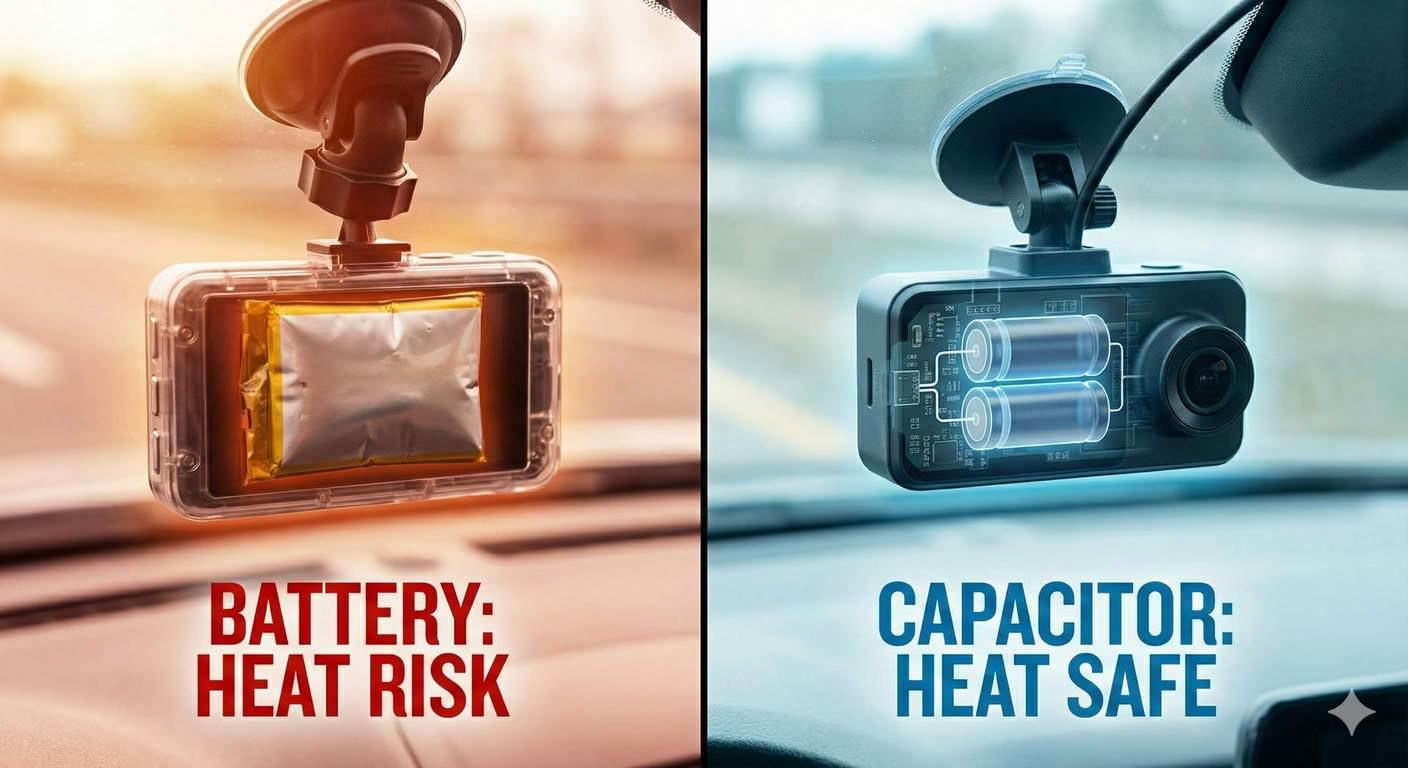Think a battery dash cam is better? Think again. We explain why lithium batteries swell in heat and why a capacitor’s “zero battery life” is actually a safety feature.
Table of Contents
Introduction
If you buy a dash cam with a battery in 2025, you are putting a ticking time bomb on your windshield. Better to know more from here Best Dash Cam for Heat and Hot Weather.
You think your dash cam just watches quietly. It doesn’t. It’s a tiny power system baking on your dashboard—often in direct sun, often at heat levels that would break most electronics. Take this seriously: Lithium-ion battery dash cams can become fire hazards in hot weather. Super-capacitor models are the safe, smart choice. Let me explain why in simple terms.
🔥 The Swollen Battery Danger
Lithium-ion batteries hate heat. Park your car on a sunny day, and that dashboard hits 140°F. At that heat:
- Battery fluid expands
- Cells puff up like balloons
- Plastic cases crack from pressure
- Glue melts and parts split open
When these batteries fail, they don’t just die quietly. They can leak toxic fluid, spew smoke, or burst into flames through “thermal runaway.” This isn’t a small fire. It spreads fast in a car full of seats, carpets, and fuel lines.
I’ve seen photos after these fires: melted dashboards, blackened windshields, cracked camera cases. These aren’t minor issues—they’re warning signs of a real fire risk. A swollen battery isn’t just broken. It’s dangerous.
❌ The “Broken Dash Cam” Myth
Many users complain: “My capacitor dash cam shuts off the second I turn off my car! It’s broken.”
They’re wrong—and this “fix” could be risky.
Here’s the truth: Capacitor dash cams should shut down fast when your car stops. This isn’t a flaw. It’s safety design. Quick shutdown:
- Prevents file corruption (so your crash footage stays usable)
- Avoids overheating when your car’s power is unstable
- Stops tiny charging circuits from cooking a hot battery
In short: Immediate shutdown saves your evidence and your car. It’s smart protection—not a defect.
🔌 The Real Parking Mode Fix
Need parking mode? (That’s when your dash cam records while parked.)
Never trust the camera’s tiny internal battery or capacitor for this.
Why? They’re too small to run for hours. They exist only to:
- Save your last video file safely
- Shut down cleanly when power cuts
The right solution? Hard-wire your dash cam with a proper kit:
- Uses your car’s main power (with safety fuses)
- Has a low-voltage guard to protect your car battery
- Delivers steady power without risky heat buildup
Hard-wiring isn’t complicated—it’s the only safe way to run parking mode. Skip this, and you risk fire or dead batteries.
⚖️ Battery vs. Capacitor: Simple Comparison
| Feature | Lithium-Ion Battery | Super-capacitor |
|---|---|---|
| Heat Safety | Swells or catches fire | Handles heat safely |
| Fire Risk | High (can spray flames) | Very low |
| Off-Power Runtime | Longer—but heats up fast | Seconds (only for safe shutdown) |
| File Safety | Files corrupt if power dies | Saves files cleanly |
| Hot Climate Life | Months (then swells) | Years (no swelling) |
| Parking Mode | Unsafe alone—needs hardwire | Unsafe alone—needs hardwire |
Safety Check: Is Your Battery Swelling?
If you still own a battery-based dash cam (like an old Yi or Roav), you need to inspect it for “Spicy Pillow” syndrome before summer hits.
Amazon reviews love bold claims. “Battery is better.” “Capacitor is useless.” “My car battery died.” The problem? Most reviewers mix up three totally different things: the dash cam’s internal power type, parked recording power, and how heat affects longevity. This guide makes the choice simple—and keeps you from buying for the wrong reason.
Verdict in 30 seconds: pick the power type that matches your reality
Most people don’t need a debate. They need a clear match. Here’s the fast read on super capacitor vs battery dash cam choices.
- You drive in hot weather or park in the sun
- You want long-term reliability over “extra minutes” of power
- You only need internal power for safe shutdown and saving the last file
- You prefer fewer internal battery worries over time
- You want short, unplugged moments without external power
- Your cabin temperatures are mild and you’re realistic about lifespan
- You understand it’s not a true parking mode power source
- You’re okay with more sensitivity to heat and aging
The review confusion in one line
Most “battery vs capacitor” reviews are really about parking mode expectations. Reviewers blame the wrong component, then the internet repeats it forever.
What to trust instead
- Reliability over months of daily use
- Heat behavior during long parked hours
- How the camera handles safe shutdown and file saving
- Whether parking mode is powered properly (separate from internal power)
Why Amazon reviews are wrong (and why they sound so confident)
The loudest reviews usually come from two groups: people who got a perfect unit and people who had a bad week. Both can be honest. Both can be misleading. Here’s what’s happening behind the scenes.
Three mix-ups that make reviews unreliable
- Mix-up #1: Internal battery vs car battery. A dash cam’s internal battery is typically for safe shutdown and saving the last clip. It’s not meant to power hours of parking surveillance.
- Mix-up #2: Parking mode vs “it stayed on for a bit.” True parking mode is a system: power + settings + storage. A battery dash cam running briefly after shutdown is not the same thing.
- Mix-up #3: Heat damage vs “bad product.” A battery can degrade faster in hot cabins. That can look like random failures, swelling, or shortened runtime. Reviews call it “defective,” but it’s often environment + time.
What is a super capacitor dash cam? (plain-English explanation)
If you’ve asked what is a super capacitor dash cam, think of it like a sprint battery. It stores a small amount of energy fast, releases it fast, and is great for safe shutdown. It’s not built to run all night. It’s built to finish the job cleanly.
What a super capacitor is good at
- Keeping the camera stable during brief power interruptions
- Saving the last file correctly when you turn the car off
- Handling hot cabins more gracefully over time
- Reducing “corrupted last clip” frustration
What a super capacitor is not
This is where review expectations go sideways.
- Not a replacement for true parking mode power
- Not a multi-hour “recording while parked” solution by itself
- Not a magic shield against poor mounting, poor storage, or bad settings
Which is better a capacitor or battery? (the honest answer)
The question which is better a capacitor or battery is a trap—because “better” depends on your environment and your expectations. For most drivers, especially those dealing with heat, a capacitor-style design is the calm, low-drama choice. For people who want a little flexibility unplugged, battery can be convenient. But convenience isn’t the same as long-term reliability.
✅ The Bottom Line
If you live where it gets hot: Treat your dash cam as a safety device—not an accessory.
- Lithium-ion battery models risk fire when heated.
- Super-capacitor models won’t run all night—but they won’t melt or ignite either.
- Always hard-wire for parking mode. No exceptions.
The smart setup? A hardwired super-capacitor dash cam. It keeps you safe and your evidence intact.
👉 Hot climate tip: Replace old battery dash cams now. Check our easy guide: Best Heat-Safe Dash Cams. Your car—and your peace of mind—will thank you.
Don’t wait for smoke to see the risk. Your dash cam should protect you—not put you in danger.


